When you move to another country in the age of thirty-one, and the only thing you can say is to greet and count to ten, all you have to do is to quickly sing up for the language course and start learning. But each language course is different, each lecturer uses different methods and sometimes it may seem that absorbing the language does not go the way you thought it would go.
Learning a foreign language in adult age is completely different from how children can learn a foreign language (as I wrote in my guest post for Newly Swissed). However, for most adults, learning a new language is not as easy and intuitive as it can be for children. On the blog, you could already read 5 ways to learn foreign language. Of course, if you are exposed to the new language on the daily basis, learning goes much faster. There is nothing left for the less lucky ones than to look for logic and to try to reconcile the new language with mother tongue or other languages (if possible).
I’m not a certified language lecturer, so do not expect a precise interpretation of German grammar rules. However, I tried to put together five rules that can help you a lot in the beginnings of learning German. Yes, you will need to learn a few things by heart, but believe me, these are things really pay off!
1. Der, die, das articles
When you have a foreign language at A2 level, some will forgive you not using (or doing mistakes when using) the articles der, die, das with nouns. However, as soon as your language level begins to rise, you should begin (or at least try) to use them properly. I found this sheet which explains that the suffix of nouns is important for determining the article very helpful. In more of 90% of cases, this rule applies. But you have to memorize it.
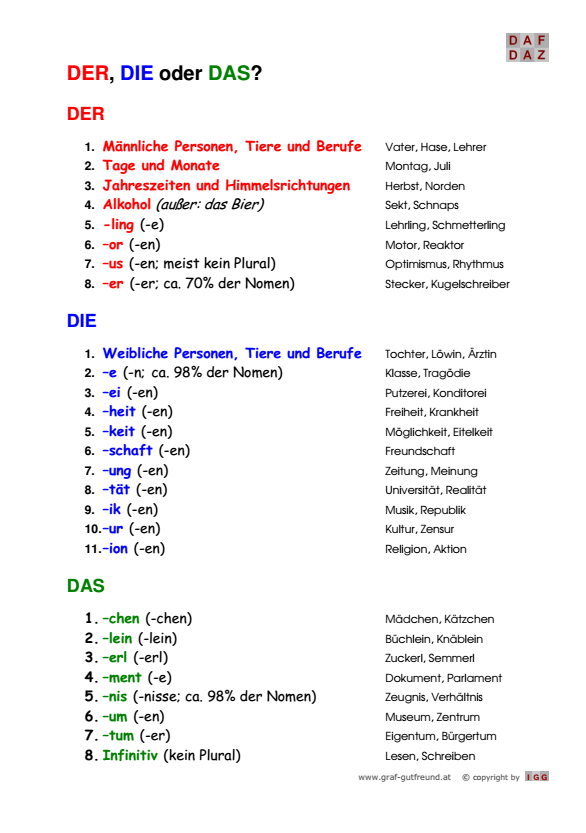
2. Articles der, die, das for compound words
German is full of compound words. So for example: Toilletenbürstenbenutzungsanweisung (don´t laugh, it´s the longest word I´ve come across while working on this post 🙂 ).
When such a word appears in front of you, it can make your hair stand on end. You are terrified that you should try to read it out loud. Or assign an article. You do not have to despair. Any such word can easily be logically decomposed.
Like the given example:
And then you just need to follow Rule # 1 – the last word is Weisung (that is, instructions). It ends with a suffix –
3. Verb is in second place.
I do not want to discuss thoroughly the order of the words in a sentence, but what will surely help you is the rule that the verb in the declarative sentence is always second.
This is clearly illustrated by the following simple sentences:
Ich komme aus Tschechien.
Er ist in der Schule.
It doesn´t have to be the subject, that comes first in a sentence. It can be also a time definition:
Im Sommer schwimme ich gerne.
Or a subordinate clause :
Wenn ich morgen Zeit habe, komme ich zu dir.
The same applies to open questions:
Woher kommst du?
Note for advanced: In the subordinate clause, the verb is always at the end.
4. Where?
There are 4 falls in German! Nominative, genitive, dative, and accusative! Yay! Only 4 (I know what I´m talking about since my native language has 7 falls!). But the fewer the falls, the more rules German is trying to get into their use. The real complication comes when using prepositions. Some are given only for dative, some only for accusative. But there are some, called
Wächselpräpositionen, that can be used with both dative and accusative!
Again, you should try to learn these prepositions by heart. And then, notice the difference between the article used:
Ich bin in der Bäckerei. – I’m in the bakery. – Where I am? – Dative (you are still)
Ich gehe in die Bäckerei. – I go to the bakery. – Where I go? – Accusative (you´re moving)
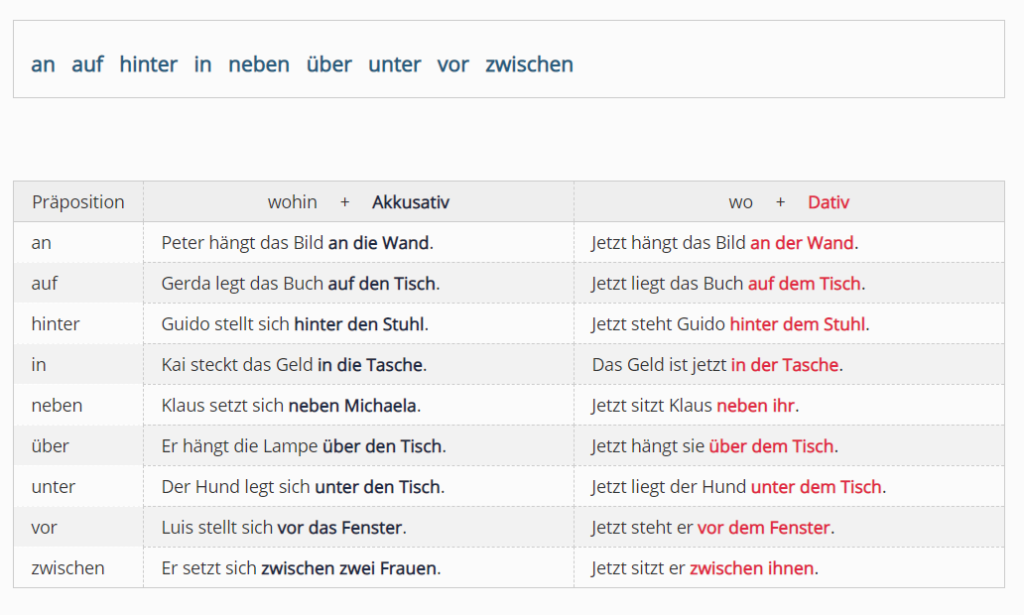
Source: https://mein-deutschbuch.de/wechselpraepositionen.html
5. Responses and Answers
I remember how embarrassing it was when a “classmate” next to me sneezed and I did not know how to respond in German? Now I know you say Gesundheit! For such quick reactions, no textbooks will prepare you.
Or someone tells you a story, but you’re only able to comment “Hmm” or “oh” and help with raised eyebrows or other facial expressions to express at least some emotion.
What about learning a few other responses?
Sicher or Klar – sure
Wirklich? – Really?
Spinnst du? – Are you crazy? Are you joking? (OK, the meaning is more like: “Are you f*****g kidding me?” so be careful when using it ; ) ).
Meinst du das ernst? Das kann nicht Wahr sein! – Do you mean that seriously? This can not be true!
And finally, the fancy thing for those who will ever be exposed to the Bernese dialect, bärndütsch. Just try to say aloud “äuä“. It has everything in it! “Really? Are you crazy? Are you joking? Do you mean that seriously? This can not be true!” 🙂
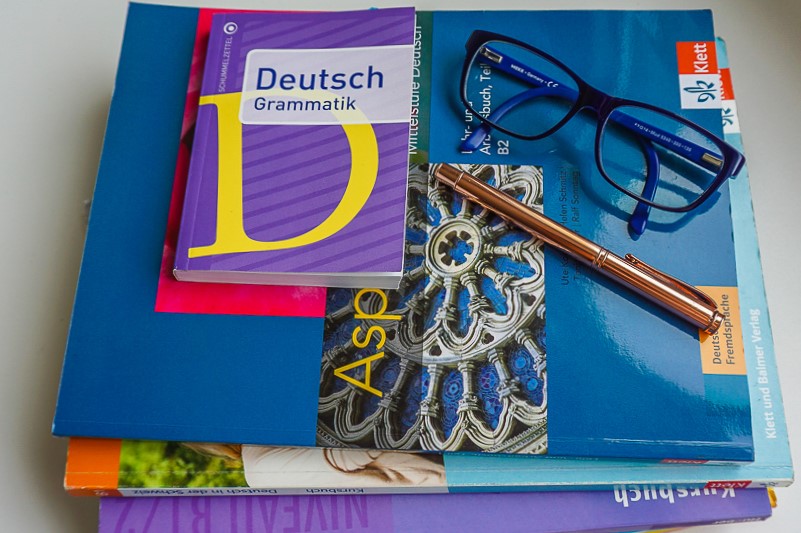
As I wrote in the beginning, I am not a certified German teacher. I´m still learning German “on the go”. Sometimes I feel like an idiot because I’m still not the level I want to be. But then I realize that people can feel even worse! Those, who decided to learn Czech 😀
I hope that this summary will help you to stop being afraid of German and start enjoying learning it (if possible 🙂 ).
If you don´t want to miss any of my recent posts please sign up for my blog in the top right-hand corner of this page. Thank you. Be sure to follow me on Facebook, Pinterest, and Instagram. And of course, I look forward to reading all your comments.
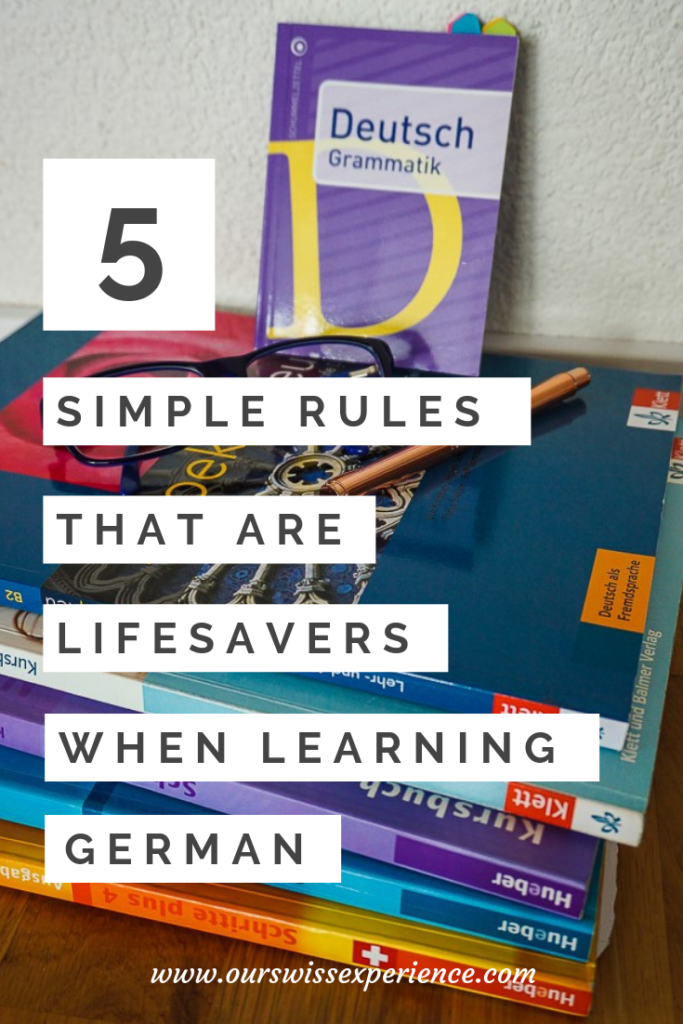




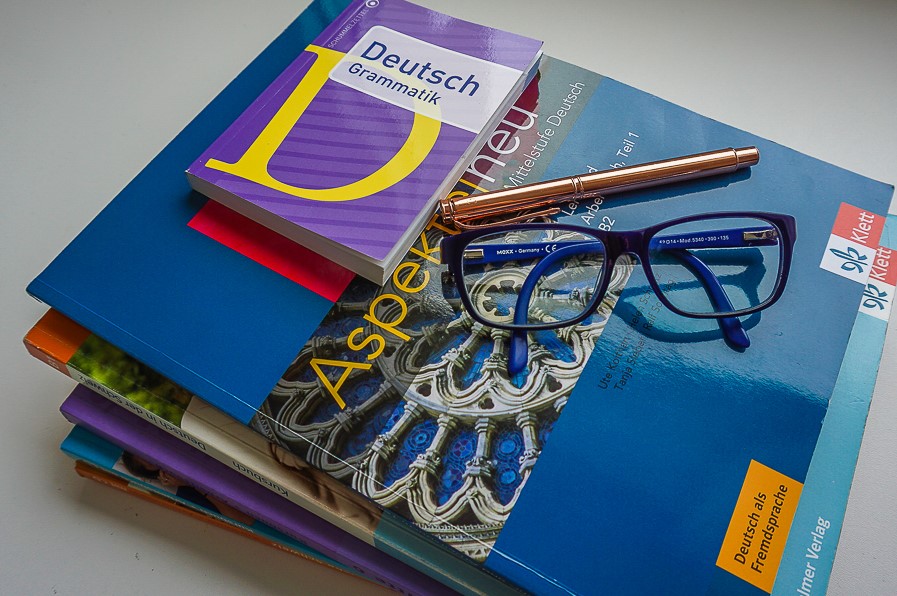











11 Comments. Leave new
“Toilletenbürstenbenutzungsanweisung” oh my Goodness! I’m sure you have seen this one: https://www.youtube.com/watch?v=NcxvQI88JRY
As a native (Swiss) German speaker it is very interesting to go through those rules, especially about the articles (I had no idea!!) and the falls (they’re the worst, and even my fellow Swiss people make mistakes.)
Respect to everyone who tackles the German language. If in Bern, as you say, it’s always a good idea to use “äuä“ 😉 Other dialect terms I like are “hurti” and “gäng” – can’t wait for the playoffs. Mario Rottaris is going to be in the TV studio commenting and using those words!
Thanks for the videa! I had a good laugh 😀
I will have to look at that first point more closely – der die and das are my biggest problem when it comes to german and thats why i love swiss german so much – you can mumble your way through it!
Haha, that´s the advantage of using the swiss German 😀
Wow! I am going to write down these tipps, thanks for sharing!
You´re welcome 😉
WOW thank you so much for these brilliant tips!
Hi Hanka, thanks for sharing the tips. Ich stimme dir zu.. May I ask from which publisher do you bought the purple Pocket Book with the title Deutsch Grammatik? Mind to share?
Hi Ahmad, I bought this pocket grammar book a few years ago in the Aldi grocery store.